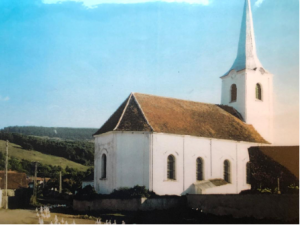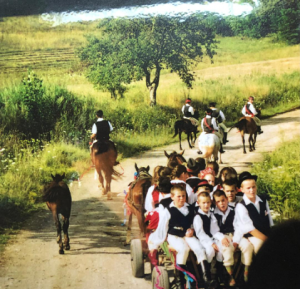Partner Church Committee
Partner Church Committee
Connecting the First Parish in Bedford with
Transylvania since 1994,
the Philippines 2004 – 2020,
and the Khasi Hills, 2014 – 2019.
Chair: Sharon McDonald
The purpose of the Partner Church Committee is to support the relationship between the First Parish in Bedford and our partner church in Abásfalva, Transylvania (Romania) and to partner with other Unitarians and Universalists around the world.
More than 100 Bedford parishioners have visited Abásfalva, and prior to the pandemic, we had group trips every other year. We hope to resume these trips as soon as possible. If you are interested in traveling with us to Transylvania, contact Committee Chair Sharon McDonald through our office (office@uubedford.org). Or…come and join us for one of our regular meetings and learn about our friends and partners around the world!

Transylvania
“Transylvania? Is that a real place?”
Mention Transylvania and most people respond, “Transylvania? Is that a real place?” Oh yes! Transylvania exists—not a country, but a region of Romania 39,000 square miles in area, or about the size of Ohio. In the north central area, where our partner village, Abásfalva, lies, much of the land is green and rolling. There is much forest left. Cows and sheep and goats graze in upland pastures; and corn and potatoes, melons, and the tastiest tomatoes in the world grow well. Yet the farms are mostly subsistence farms, the people are humble, and the technology more typical of America a hundred years ago. Village houses are heated with wood, and while there is a water faucet in most homes, computers are not common.
Who lives in Abásfalva?
The Carpathian Mountains and the Transylvanian Alps to the east and south set Transylvania apart from the rest of Romania. It shares its western border with Hungary, and for the two centuries before a World War I treaty gave it to Romania, Transylvania was a part of Hungary. There is still a large Hungarian minority, especially in the villages in Harghita County where Abásfalva lies, who identify themselves as Transylvanians, not Romanians. Their first language is Hungarian. (Actually, the name we use for our partner, “Abásfalva,” is the Hungarian name for the village. If you are addressing a letter or looking for the village on a map, you must use its Romanian name, “Aldea.”) A map showing the small village of Abásfalva will be in very large scale!
What are the other villages and towns like near Abásfalva?
There are many villages scattered nearby, but the nearest town of any size is Odorheiu Secuiesc (in Hungarian, Székelyudvarhely) —only ten miles away, but thirty minutes by car because of the winding roads. There you will find stores and restaurants, modern apartment buildings, medical care, the train and bus depots, and the high school. Although they feel emotionally connected to their village, there is strong pressure on the younger people to leave and find employment, education, and a better life in towns and cities like Udvarhely. The Abásfalva population is about 400 with an increasingly Roma (“gypsy”) majority.
What lies in the future?
The Szekely Hymn so beloved by Transylvanians begins:
Ki tudja merre, merre visz a végzet,
Göröngyös úton, sötét éjjelen…
This translates:
Who knows where, where fate leads? Rough road, dark night…
Like many rural places in the US and elsewhere, Abásfalva’s future is uncertain. There are many challenges, and yet there is new leadership and energy. As her partner, we have promised to stand with her, not forsaking or forgetting her, wherever fate leads. A real place? For us of the First Parish in Bedford, Transylvania is indeed real; the important and precious home of our sisters and brothers.

The Philippines
Beginning in 2004, the youth of our congregation sponsored Karlisle Isobel Piera, a member of the UU Dumaguete Fellowship in the Philippines, so that she could attend school. The sponsorship was through a program of the UU Partner Church Council, and we sponsored her from first grade through high school. Each year the First Parish Bedford UU kids sent letters and pictures of themselves to Karlisle and in return she sent us letters, pictures…and her report cards!
Now she is in her third year of college working toward a degree in accounting and a future law degree. She continues to correspond with us. She is an amazing, accomplished young woman and will be a leader in whatever she does!
Khasi Hills of North India
From 2014-2019, First Parish was a sponsor of the Margaret Barr Memorial School. The school has about 50 students from pre-K through 7th grade in Lawsohtun, a suburb of Shillong in the Khasi Hills. Founded in 1982, the school gets some funding from the State of Meghalaya but was helped largely through our financial support. In 2015, two of our parishioners visited the school on a pilgrimage to the Khasi Hills.
Margaret Barr, for whom the school is named, was a Methodist born and raised in Yorkshire, England. She became a Unitarian in 1921 as a student in Girton College, Cambridge, after a friend invited her to a service. The sermon that day was a scholarly and appreciative explanation of Hinduism. Barr loved the Unitarian approach to other faiths…and she went on to become a minister herself.
While she was serving Rotherham Unitarian Church (1927-1933), she learned about the indigenous Unitarians in the Khasi Hills of India and about their founder, Hajom Kissor Singh. After a visit to India, she knew she wanted to return. Several years later, she got a job at a girl’s school in Calcutta that paid for her move to India. Eventually, Margaret Barr made her way to the Khasi Hills, where conditions of illiteracy, poverty and ill health predominated. H.K. Singh had died and congregations were floundering. She opened a school and trained teachers in Shillong. So that students didn’t have to leave home, she opened another school in Kharang, then opened a Dispensary, then finally made Kharang her permanent home. She opened schools in villages, then turned the schools over to the government. Margaret Barr died in 1973.
Clearly, Margaret Barr heeded the advice given to her by Gandhi, “Keep out of jail and find some constructive work to do.”
